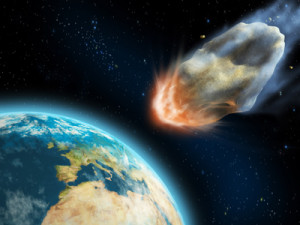ASTEROID COLLISION PENDING – HOW CAN WE AVOID IT?
 Steve Carell’s new movie, Seeking a Friend for the End of the World, opened yesterday. Despite its being billed as a comedy (one with a rather dreary basis), the movie has gotten a lot of people thinking about one thing: if a killer asteroid was headed toward Earth, is there anything we could do as a species to avoid doomsday?
Steve Carell’s new movie, Seeking a Friend for the End of the World, opened yesterday. Despite its being billed as a comedy (one with a rather dreary basis), the movie has gotten a lot of people thinking about one thing: if a killer asteroid was headed toward Earth, is there anything we could do as a species to avoid doomsday?
The unfortunate truth is that the world would probably be helpless to do anything.
When doomsday scenarios are considered, planners usually give months or even years advance notice time to come up with a plan to divert the colliding body and save the world. Now, as the events of last week show, huge asteroids can, literally, just pop out of the cosmos and into our neighborhood just a few days after discovery.
Right now, there are millions of known asteroids (and untold numbers more undiscovered) floating around the solar system, mostly between Mars and Jupiter, safely out of Earth’s way. Of the millions of asteroids, over 8,800 are classified as near-Earth. Of the near-Earth objects, just over 4,700 are considered as potentially hazardous, which is defined as an object over 500 feet in diameter that can come within 4.6 million miles of Earth.
Obviously, a metallic space rock 500 feet across traveling at up to 15 miles per second could do an immense amount of damage. For comparison, the object (most likely a comet) that caused the Tunguska Incident was probably less than 100 yards (300 feet across) but still leveled forests for over 1,000 square miles.
Needless to say, if a Tunguska-sized object were to hit a populated area, the death toll would be apocalyptic. Large impactor? Worldwide devastation and possibly an end to civilization as we know it. So, if scientists were to discover a doomsday asteroid on a collision course with Earth, could we do anything about it or would we simply have to resign ourselves to a terrible fate and possibly go down in history like the dinosaurs?
The problem with many doomsday scenarios: when contemplating ways to defend our planet, many planners always give several months and often years of notice. Problem: asteroids have a way of sneaking up on us, which is not hard to do considering that there are more people working at the average McDonald’s than there are full-time asteroid hunters manning the world’s observatories. Earlier this year, it was reported that Los Alamos had completed a study wherein nuclear weapons showed promise in deflecting asteroids but, for many, such a scenario should be considered last resort, not first option.
The widely agreed upon solution: early detection, which can only be achieved through a vigilant watch of the skies by skilled astronomers, professionals and amateurs alike.